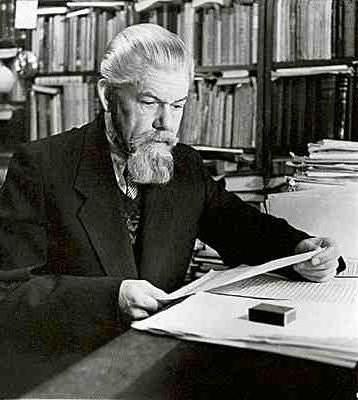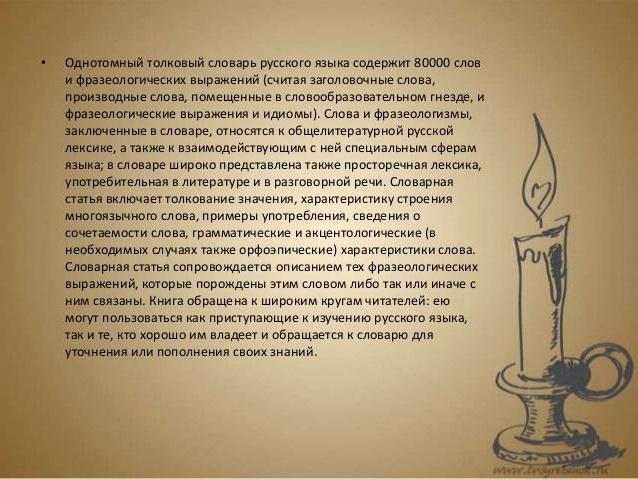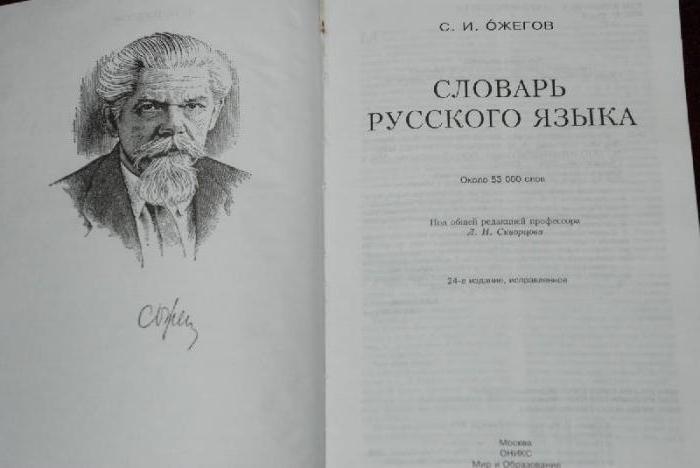Ozhegov Sergey Ivanovich - a famous linguist, lexicologist, professor, doctor of philological sciences, creator of the Explanatory Dictionary of the Russian Language, was born on September 23, 1900 in the Tver province, in the village of Kamennoye, Novotorzhsky Uyezd.
A short biography of Ozhegov for children primarily tells about the family in which the future creator of the Russian Dictionary was born and raised. Sergey's father, Ivan Ozhegov, worked as a process engineer at a local cardboard and paper mill. Mother, Alexandra Fedorovna, worked as a weaver and was the grandniece of a famous teacher and philologist, professor of St. Petersburg University Gerasim Petrovich Pavsky, whose “Philological Observations on the Composition of the Russian Language” were published twice during the lifetime of the author and were awarded the Demidov Prize. Perhaps the fate of Ozhegov was predetermined by knowledge of such a famous relative, pride in being related to him and a desire to continue the work of a person who understood the structure of the language wider than his talented contemporaries.
Ozhegov: biography for children
Sergei Ozhegov in his youth was fond of football, which was just gaining popularity, was in the sports section, had high growth, good tempering and attractive appearance.
After moving with his family before the start of World War I to Petrograd and after graduating from high school, in 1918 he became a student at Petrograd University, making an informed, well-defined choice in the direction of philology. Moreover, in those years, terrible and hungry, one had to have great courage in order to devote his future to scientific activity.
The first steps in the scientific field
Soon, the classes that began were interrupted because Sergey was called to the front. Thus, fate presented him with a real male test, which he withstood with dignity, participating in battles in Russia and Ukraine. At the end of military service, in 1922, Sergei Ozhegov immediately began to study at the university at the faculty of linguistics and material culture. Ozhegov’s biography is short, if viewed from the point of view of the activities of Sergei Ivanovich, because he devoted his whole life to the study and promotion of the Russian word. All the years he worked intensively on the history of native literature, listened to lectures by Sergei Petrovich Obnorsky, a Russian linguist, Russian scholar, studied at the Leningrad Institute of the History of Literature and Languages of West and East, participated in a seminar by Nikolai Yakovlevich Marr, a Russian orientalist. The scientific atmosphere that prevailed in Leningrad in the 1920s contributed to the creative development of the scientist. Companions and senior colleagues taught there - V.V. Vinogradov, B.A. Larin, L.P. Yakubinsky, B.V. Tomashevsky. The first steps in the science of the scientist, young and talented, were supported by an academic professor with experience, who signed Ozhegov’s submission to graduate school, where he entered in 1926.
The Russian word is the work of a lifetime
Since the end of 1920, Sergey Ozhegov, a biography whose photos are familiar to all admirers of his work, who made a huge contribution to Russian literature, worked on the Explanatory Dictionary of the Russian Language, a large project that was later called the Ushakovsky Dictionary. It was an exceptionally fruitful time for a talented philologist who fell in love with the vocabulary work that eminent colleagues helped him conduct.
Ozhegov’s biography describes a close friendship with Dmitry Ushakov, the legendary Russian scientist, an original artist, an exceptional teacher, lover and collector of old times, a courageous and wise man. The idea to publish the first explanatory dictionary of the Soviet period, in which there was no “Sovietness,” was criticized for evading the tasks of that time and the philistinism present, and the unfolding campaign of 1935, in which various methods were used, was aimed at expelling competent and successful scientists.
Work in the capital of Russian cities
Ozhegov’s biography is closely connected with the capital of Russian cities - Moscow, where he moved in 1936, very soon entered the pace of Moscow life and began to engage in teaching activities in higher educational institutions. He was fascinated not only by theoretical courses, but also by the language of fiction with its pronunciation standards. Ozhegov merged with Moscow, but even after years he loved to visit the city of his youth and visit with a trusted friend, the talented Leningrad philologist Larin Boris Alexandrovich. All this time, a great place in Sergey’s life was occupied by friendship with the brilliant Dmitry Ushakov, who was now nearby.
The fate of the two younger brothers Sergei was tragically. The younger, Eugene, even before the war died of tuberculosis, and his middle brother, Boris, died of starvation in the besieged Leningrad.
Years of war
Work on the dictionary Ozhegov finished before the war, in 1940 came the 4th (last), which became a key event in the scientific field. Ozhegov, who implemented such a grandiose project, was already living with new ideas, one of which was the compilation of a one-volume explanatory dictionary. But the implementation of this project has been put off for years. The reason for this was the beginning of the war.

Ozhegov did not evacuate with research teams sent to Siberia and other Russian provinces. He stayed in Moscow, where he continued to do his favorite business, while on duty at night in patrols, trying to at least somehow help his hometown in such difficult times. During this period, Sergei Ozhegov developed a course of Russian paleography, which was taught for students of the Pedagogical Institute. The organization of a language scientific society that studied the language of wartime is a matter to which Ozhegov devoted himself during the war years. The interesting thing from the biography is the following: the Russian philologist tried all his wartime to help and helped many of his colleagues return to Moscow from evacuation; only Dmitry Ushakov, who did not endure the climate of Uzbekistan, returned to the city. His heart stopped on April 17, 1942, asthma became the cause of death.
Personal character traits Ozhegova
In 1947, Ozhegov enthusiastically took up his new brainchild - the Dictionary of the Russian Language, the first edition of which was released in 1949 and immediately attracted the attention of critics, readers and scientists. Ozhegov’s biography includes 8 reprints of the Dictionary during the life of the scientist, and each of them was carefully reviewed by Sergey Ivanovich for errors and shortcomings. And today the "brainchild" of a famous Russian philologist is popular and is a kind of lexicographic standard. Ozhegov’s biography talks about this great philologist as a responsive person who is always ready to help, be it any person who turned to him for an explanation of a particular word, or a young aspiring specialist inspired by the ideas of Sergei Ivanovich.

Sergey Ozhegov received such deserved praise and high praise for such painstaking and responsible work. Interesting facts of the biography tell us that the author of the Russian dictionary was awarded very harsh criticism published by a certain Rodionov N. in the newspaper "Culture and Life". The review was called “On One Unsuccessful Dictionary”, and its content corresponded to the title. Ozhegov could not endure such an unfair article and wrote a response to the editor-in-chief of this publication with a copy to the newspaper Pravda, presenting to the unfortunate reviewer a tough argument based solely on philological principles. And defended his point of view.
The promotion of the native language is the life work of Ozhegov
The 40s became one of the fruitful years for Ozhegov. He worked a lot, the projects conceived at that time were successfully implemented ten years later. One of them is the Center for the Study of the Culture of Speech, which Ozhegov led until the end of his days. One of his key areas was the study of native speech and its propaganda. Together with the staff, Sergei Ivanovich spoke on the radio, advised broadcasters and theater workers; the notes of the famous philologist often appeared in print, and the author himself constantly took part in literary evenings at the House of Scientists and invited such writers as KI Chukovsky, FV Gladkov, Lev Uspensky to collaborate. Then, under his editorship, dictionaries of pronunciation norms that became popular even began to be published, studied even in distant foreign countries.

In the 1950s, the popular science series “Speech Culture Issues” appeared in the system of the Russian Language Institute - a periodical published by S. I. Ozhegov as the inspiration and organizer.
Ozhegov's biography, brief and informative
Sergei Ivanovich, conducting extensive teaching and being a high-level specialist, was not a cabinet scientist and eagerly responded to the changes in the language that were included in the dictionary of an ordinary person. He was condescending to the “verbal mischief” of young people, listened to its jargon, always respected talented young researchers, provided them all kinds of help and moral support, which attracted people to him. Sergei Ivanovich was able to consider individuality in a person, therefore the young generation rallied around him (which Chukovsky called the “mighty bunch”) was revealed during the life of Sergei Ozhegov, proving and showing commitment to his ideas and intentions.
The last years of the life of Sergei Ivanovich Ozhegov were marked by hostile attitude from some “bright minds” and proud attacks in his direction. Colleagues who proved particularly successful in the field of weaving intrigues called him "non-scientist", ignored the enormous contribution to science, and tried to humiliate him in every possible way. But this did not stop Sergei Ivanovich; most importantly, he was honest with himself.
Ozhegov Sergei Ivanovich did not die December 15, 1964. The scientist was buried in the wall of the Novodevichy necropolis, despite his desire to rest in the Vagankovsky cemetery.